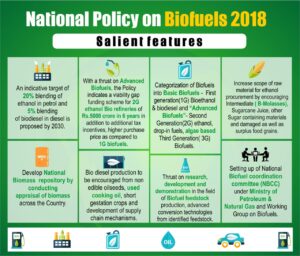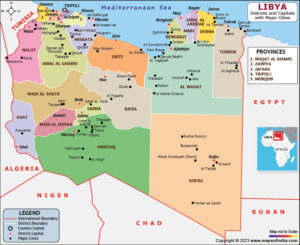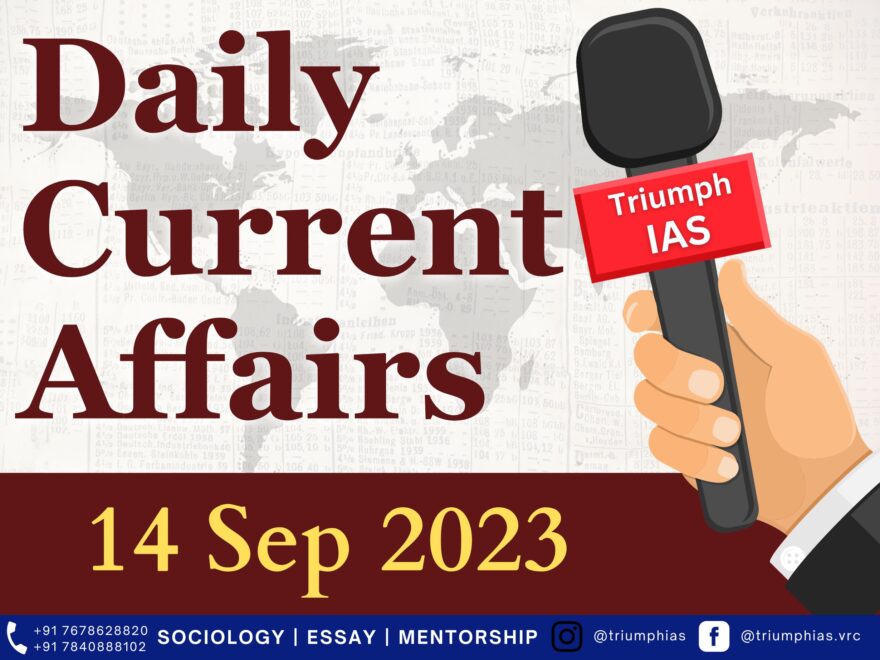Current Affairs 14 Sep 2023
Today’s News
The complex path to biofuel sustainability
(Current Affairs 14 Sep 2023 | Relevant for GS paper-3)

- Until a few years ago, working on bio fuels called for constant justification in the face of electric vehicles (EVs) taking over the world. Today, while there is no doubt that EV adoption has amplified over the years; there is growing awareness of the fact that no decarbonisation strategy is trade-off free.
- ‘Biofuel’ is a blanket term that includes both sustainable and unsustainable fuels, and an understanding of their difference will be essential to drive effective decarbonisation.
- In India, biofuel is synonymous with first-generation (1G) ethanol, which is primarily sourced from food crops. The policy target in India of achieving 20% ethanol blending with petrol (E20) by 202526 is expected to be met almost entirely by 1G ethanol made from sugarcane and food grains.
- Second-generation (2G) ethanol, which is made from crop wastes and residues, is unlikely to contribute much to achieving this target due to several challenges related to feedstock supply chain and scaling up.
- The groundwater depletion implications of growing sugarcane are well known, but the food security implications of groundwater depletion and of using food grains for ethanol production are harder to imagine because India is currently a surplus food producer. But there are several reasons why diverting the surplus produce towards energy or specifically growing a crop for energy may not be a sustainable strategy.
- First, India’s crop yields have already stagnated, and global warming is expected to reduce yields, which means that the same area under cultivation (arable land) will produce less with time but will need to suffice for a growing.
- Second, a recent study led by the University of Michigan projected that the rates of groundwater depletion could triple during 204081 compared with the current rate. This is again attributable to temperature rise and the resultant increase in crop water requirements.
- Third, the agriculture sector is one of the hard esttoabate in terms of direct greenhouse gas (GHG) emissions. So, increasing GHG emissions from this sector for motor fuel production in order to decrease GHG emissions from the transport sector is an unnecessary balancing loop that would achieve little net benefit.
- In India, the ethanol blending policy has been a good strategy to deal with the surplus sugar production. Another good strategy to deal with the surplus sugar production would be to reduce surplus sugar cane cultivation.
- ‘Sustainable’ bio fuels are produced from crop residues and other wastes, with low water and GHG footprint. The Global Biofuels Alliance that was formed at the G20 Summit in New Delhi last week is expected to strengthen the development of sustainable bio fuels, in addition to promoting ethanol uptake. It is, therefore, a historic moment for India, demonstrating its commitment to climate action with global cooperation.
- The Energy Transitions Commission, in its report on ‘Bio resources within a NetZero Emissions Economy’, recommended that biomass should be prioritised for use in sectors where there are limited low carbon alternatives.
- According to the International Energy Agency, to achieve net zero emissions by 2050 globally, sustainable biofuel production needs to triple by 2030 to fuel modes that have few other mitigation options.
Little succor: Any failure to anchor inflation will add to the risks to growth
(Current Affairs 14 Sep 2023 |Relevant for GS paper-2)

- The latest Consumer Price Index (CPI) data from the NSO, which shows an easing in the pace of price gains from July’s 15 month high, provides little assurance that retail inflation has actually begun to come under control.
- While the headline yearonyear pace of inflation decelerated slightly in August to 6.83%, gains in food prices, measured by the Consumer Food Price Index, still hovered uncomfortably close to 10%. And urban consumers, in fact, faced food price inflation of 10.4%.
- Eleven of the 12 items on the heavyweight food and beverages group of the CPI logged price increases, with oils and fats, the sole item logging a yearonyear decline in prices, posting its first sequential increase in nine months.
- Vegetables, however, provided the silver lining to a still clouded outlook for food prices with tomato leading an appreciable month on month deflation of 5.88% in the 19 member basket.
- The Centre’s imposition last month of a 40% export duty on overseas shipments of the bulb till December 31, a clearsign that it is quite concerned about the continuing uptrend in onion prices, is yet to make much of a tangible impact.
- The near term outlook for inflation is also made more uncertain by other factors including a distinct deficit in monsoon rainfall.
- Besides overall 10% shortfall, sharp regional and temporal anomalies in rain distribution have impacted either the sowing or the quality of produce of several farm items. Kharif sowing of pulses had, as on September 8, recorded an 8.6% shortfall compared with the year earlier period.
- Unless CPI inflation decelerates by an incredible 250 basis points in September to a 4.33% pace, price gains are certain to substantially overshoot the monetary authority’s 6.2% forecast for the July September quarter, leaving it with few real options in order to achieve its medium term price stability goal of 4% inflation.
Protecting floodplains is the need of the hour
(Current Affairs 14 Sep 2023 |Relevant for GS paper-3)

- Humanity is struggling with a shortage of water as well as an excess. As the World Health Organization stated, “Floods are increasing in frequency and intensity, and the frequency and intensity of extreme precipitation is expected to continue to increase due to climate change.
- The 2013 floods in Uttarakhand, the 2014 floods in the Kashmir Valley, the 2015 floods in Chennai, and the 2017 floods in Gujarat all caused loss of lives and livelihoods and massive damage to infrastructure.
- As per the Geological Survey of India, over 40 million hectares, which is nearly 12% of the total land area of India, is prone to floods. The severity and frequency of floods has especially affected our cities, where there is little effort made in maintaining natural topography.
- India primarily relies on the Disaster Management Act, 2005, and the rules made in pursuance of the Act, to deal with flood management. But this law is meant to deal with multihazard risks and is not specifically focused on flood risk management.
- Disaster risks across the world are found to be situated within environmental and natural resource governance. There is a shift in the strategy of flood control in countries such as Germany, the U.K., and the Netherlands to flood risk management as opposed to flood.
- A 2018 report of the Comptroller and Auditor General of India attributed encroachments in the flood plains of the rivers of Tamil Nadu and the failure to act on them as the prime reason for the Chennai floods of 2015. The auditor called the deluge a ‘manmade disaster’.
- Illegal construction work in floodplains reduces the capacity of rivers to contain a high level of water within their banks. This is especially the case during heavy rainfall when water flows down from upper catchment areas. Thus, the tendency to occupy floodplains results in flooding.
- In the wake of the massive floods in 2013, the National Green Tribunal virtually barred construction of buildings 200 m along the banks of the Ganga, in a 2015 directive. But attempts were made to bypass this. It is also unclear whether environmental impact assessments are done properly in the State.
- Floods do not merely show the fury of nature; they are also often brought about by climate change induced rainfall. This especially impacts mountainous regions such as the Himalayas.
- There are many experiences around the world which point to the potential benefits of protecting and preserving ecosystems such as wetlands, forests, lakes, and coastal areas in reducing physical exposure to natural hazards such as floods, landslides or avalanches by serving as buffers.
- Climate change adaptation is a cross sectoral issue. It involves laws relating to land use, preservation of water bodies, coastal regulations, and environmental impact assessment.
- However, achieving this requires strong political will. Populist leaders tend to refrain from implementing “green” policies.
World Duchene Muscular Dystrophy Day
(Current Affairs 14 Sep 2023 |Relevant for prelims)

- World Duchenne Muscular Dystrophy (DMD) Day observed annually on 7th September, aims to raise awareness about DMD and improve the lives of individuals affected by this rare degenerative illness.
- The theme for this year’s World DMD Day is “Duchene: Breaking Barriers.”
- DMD is a rare genetic condition that weakens muscles progressively and affects approximately one in every five thousand boys.
- The condition results from an X-chromosome mutation and leads to difficulties in walking, followed by the impairment of other motor functions.
- Ultimately, DMD affects vital functions like breathing and heart function since the heart is a muscle too.
- Currently, there is no known cure for DMD. Treatment aims to control symptoms to improve quality of life.
Libya’s Catastrophic Flooding
(Current Affairs 14 Sep 2023 |Relevant for Prelims)

- Recently, Eastern Libya experienced a catastrophic event as floods caused by Storm Daniel, brought widespread destruction.
- Decades of war and a lack of a central government have resulted in deteriorating infrastructure, making the country highly susceptible to the recent torrential rains.
- Libya is the only nation without a climate strategy, as per the United Nations. This catastrophe underscores the urgent need for stability, unity, and comprehensive governance in Libya, as it continues to grapple with multiple crises, from internal unrest to the exploitation of migrants and oil revenue disputes.
To master these intricacies and fare well in the Sociology Optional Syllabus, aspiring sociologists might benefit from guidance by the Best Sociology Optional Teacher and participation in the Best Sociology Optional Coaching. These avenues provide comprehensive assistance, ensuring a solid understanding of sociology’s diverse methodologies and techniques.
Current affairs 14 September 2023, Today news, Today news GS, Today news upsc, Today news and views, Today news 2023, Today news Current affairs September 2023, Current affairs news, Current affairs book pdf, Current affairs best blog, Current affairs for UPSC, Current affairs 2023, Current affairs contact, Current affairs book, Current affairs program meaning

Choose The Best Sociology Optional Teacher for IAS Preparation?
At the beginning of the journey for Civil Services Examination preparation, many students face a pivotal decision – selecting their optional subject. Questions such as “which optional subject is the best?” and “which optional subject is the most scoring?” frequently come to mind. Choosing the right optional subject, like choosing the best sociology optional teacher, is a subjective yet vital step that requires a thoughtful decision based on facts. A misstep in this crucial decision can indeed prove disastrous.
Ever since the exam pattern was revamped in 2013, the UPSC has eliminated the need for a second optional subject. Now, candidates have to choose only one optional subject for the UPSC Mains, which has two papers of 250 marks each. One of the compelling choices for many has been the sociology optional. However, it’s strongly advised to decide on your optional subject for mains well ahead of time to get sufficient time to complete the syllabus. After all, most students score similarly in General Studies Papers; it’s the score in the optional subject & essay that contributes significantly to the final selection.
“A sound strategy does not rely solely on the popular
Opinion of toppers or famous YouTubers cum teachers.”
It requires understanding one’s ability, interest, and the relevance of the subject, not just for the exam but also for life in general. Hence, when selecting the best sociology teacher, one must consider the usefulness of sociology optional coaching in General Studies, Essay, and Personality Test.
The choice of the optional subject should be based on objective criteria, such as the nature, scope, and size of the syllabus, uniformity and stability in the question pattern, relevance of the syllabic content in daily life in society, and the availability of study material and guidance. For example, choosing the best sociology optional coaching can ensure access to top-quality study materials and experienced teachers. Always remember, the approach of the UPSC optional subject differs from your academic studies of subjects. Therefore, before settling for sociology optional, you need to analyze the syllabus, previous years’ pattern, subject requirements (be it ideal, visionary, numerical, conceptual theoretical), and your comfort level with the subject.
This decision marks a critical point in your UPSC – CSE journey, potentially determining your success in a career in IAS/Civil Services. Therefore, it’s crucial to choose wisely, whether it’s the optional subject or the best sociology optional teacher. Always base your decision on accurate facts, and never let your emotional biases guide your choices. After all, the search for the best sociology optional coaching is about finding the perfect fit for your unique academic needs and aspirations.
To master these intricacies and fare well in the Sociology Optional Syllabus, aspiring sociologists might benefit from guidance by the Best Sociology Optional Teacher and participation in the Best Sociology Optional Coaching. These avenues provide comprehensive assistance, ensuring a solid understanding of sociology’s diverse methodologies and techniques. Sociology, Social theory, Best Sociology Optional Teacher, Best Sociology Optional Coaching, Sociology Optional Syllabus.
Best Sociology Optional Teacher, Sociology Syllabus, Sociology Optional, Sociology Optional Coaching, Best Sociology Optional Coaching, Best Sociology Teacher, Sociology Course, Sociology Teacher, Sociology Foundation, Sociology Foundation Course, Sociology Optional UPSC, Sociology for IAS,
Follow us :
🔎 https://www.instagram.com/triumphias
🔎https://www.youtube.com/c/TriumphIAS
https://t.me/VikashRanjanSociology
Find More Blogs
|
Scope of the subject and comparison with other social sciences |
|||
|
|
|
|
Modernity and social changes in Europe |

